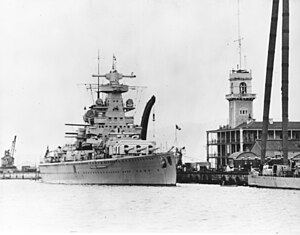
Back طراد الفئة دويتشلاند Arabic Тежки крайцери тип „Дойчланд“ Bulgarian Třída Deutschland Czech Deutschland-klassen Danish Deutschland-Klasse (1933) German Clase Deutschland (1933) Spanish ناو کلاس دویچلنت Persian Deutschland-luokka Finnish Classe Deutschland (croiseur lourd) French הסיירות מסדרת דויטשלנד HE
 Admiral Scheer at Gibraltar in 1936
| |
| Class overview | |
|---|---|
| Name | Deutschland |
| Operators | |
| Preceded by | None |
| Succeeded by |
|
| Built | 1929–1936 |
| In service | 1933–1945 |
| Completed | 3 |
| Lost | 3 |
| General characteristics | |
| Type | Heavy cruiser |
| Displacement | |
| Length | 186 m (610 ft 3 in) |
| Beam | 20.69 m (67 ft 11 in) |
| Draft | 7.25 m (23 ft 9 in) |
| Installed power | 54,000 PS (53,260 shp; 39,720 kW) |
| Propulsion |
|
| Speed | 28 knots (52 km/h; 32 mph) |
| Range | 10,000 nmi (19,000 km; 12,000 mi) at 20 knots (37 km/h; 23 mph) |
| Complement |
|
| Armament |
|
| Armor | |
| Aircraft carried | Two Arado Ar 196 seaplanes |
| Aviation facilities | One catapult |
| Notes | [a] |
The Deutschland class was a series of three Panzerschiffe (armored ships), a form of heavily armed cruiser, built by the Reichsmarine officially in accordance with restrictions imposed by the Treaty of Versailles. The ships of the class, Deutschland, Admiral Scheer, and Admiral Graf Spee, were all stated to displace 10,000 long tons (10,160 t) in accordance with the Treaty, though they actually displaced 10,600 to 12,340 long tons (10,770 to 12,540 t) at standard displacement. The design for the ships incorporated several radical innovations, including the first major use of welding in a warship and all-diesel propulsion. Due to their heavy armament of six 28 cm (11 in) guns and lighter weight, the British began referring to the vessels as "pocket battleships". The Deutschland-class ships were initially classified as Panzerschiffe, but the Kriegsmarine reclassified them as heavy cruisers in February 1940.
The three ships were built between 1929 and 1936 by the Deutsche Werke in Kiel and the Reichsmarinewerft in Wilhelmshaven, seeing much service with the German Navy. All three vessels served on non-intervention patrols during the Spanish Civil War. While on patrol, Deutschland was attacked by Republican bombers, and in response, Admiral Scheer bombarded the port of Almería. In 1937, Admiral Graf Spee represented Germany at the Coronation Review for Britain's King George VI. For the rest of their peacetime careers, the ships conducted a series of fleet maneuvers in the Atlantic and visited numerous foreign ports in goodwill tours.
Before the outbreak of World War II, Deutschland and Admiral Graf Spee were deployed to the Atlantic to put them in position to attack Allied merchant traffic once war was declared. Admiral Scheer remained in port for periodic maintenance. Deutschland was not particularly successful on her raiding sortie, during which she sank or captured three ships. She then returned to Germany, where she was renamed Lützow. Admiral Graf Spee sank nine vessels in the South Atlantic before she was confronted by three British cruisers at the Battle of the River Plate. Although she damaged the British ships, she was herself damaged and her engines were in poor condition. Coupled with deceptive false British reports of reinforcements, the state of the ship convinced Hans Langsdorff, her commander, to scuttle the ship outside Montevideo, Uruguay.
Lützow and Admiral Scheer were deployed to Norway in 1942 to join the attacks on Allied convoys to the Soviet Union. Admiral Scheer conducted Operation Wunderland in August 1942, a sortie into the Kara Sea to attack Soviet merchant shipping, though it ended without significant success. Lützow took part in the Battle of the Barents Sea in December 1942, a failed attempt to destroy a convoy. Both ships were damaged in the course of their deployment to Norway and eventually returned to Germany for repairs. They ended their careers bombarding advancing Soviet forces on the Eastern Front; both ships were destroyed by British bombers in the final weeks of the war. Lützow was raised and sunk as a target by the Soviet Navy, and Admiral Scheer was partially broken up in situ, with the remainder of the hulk buried beneath rubble.
Cite error: There are <ref group=lower-alpha> tags or {{efn}} templates on this page, but the references will not show without a {{reflist|group=lower-alpha}} template or {{notelist}} template (see the help page).
© MMXXIII Rich X Search. We shall prevail. All rights reserved. Rich X Search